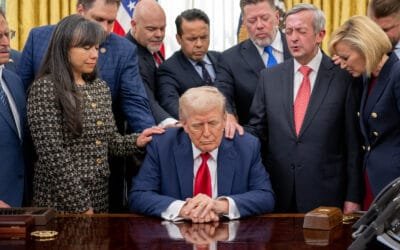America’s swing toward religion is about to be fully affirmed by the U.S. Supreme Court, judging by Chief Justice William H. Rehnquist’s comments regarding the Pledge of Allegiance phrase ‘under God’. “You may disagree that it’s ‘under God,'” Chief Justice Rehnquist said during the first week of arguments. “You may disagree that it’s ‘liberty and justice for all’. That doesn’t make it a prayer.”
Whether the phrase is a prayer and whether one regards it as prayer — is not in dispute; any reference to God is inherently religious. The Chief Justice is ignoring the idea on trial, separation of religion and state, and the legal corollary: whether the phrase ‘under God’ in a public school exercise represents government-sponsored religion, which is a violation of individual rights.
The lower court ruling left no doubt. When the Ninth Circuit Court of Appeals upheld its judgment striking down the Pledge of Allegiance in 2002, Judge Alfred T. Goodwin wrote: “A profession that we are a nation ‘under God’ is identical…to a profession that we are a nation ‘under Jesus,’ a nation ‘under Vishnu,’ a nation ‘under Zeus,’ or a nation ‘under no god,’ because none of these professions can be neutral with respect to religion.”
Judge Goodwin’s explanation matches the Founding Fathers’ radical ideas about liberty. Contrary to the Religious Right fallacy, the Founding Fathers defiantly opposed the mixture of religion and government. Many were deists, who may have believed in God but rejected religion. Some doubted the existence of God. Others, including Thomas Paine, were openly hostile to religion — any religion.
The Founders created an American republic based primarily on individual rights–a society in which the freedom of religion implicitly means freedom from religion. As James Madison, America’s fourth president, stated:
“Religion and government will both exist in greater purity, the less they are mixed together.” The Founders, who created a nation partly to escape state-sanctioned religion, created a republic based on rights, not a theocracy.
A brief history of the Pledge of Allegiance underscores America’s philosophically non-religious origins. The first organized use of the Pledge of Allegiance was 112 years ago, when millions of American schoolchildren recited the following words to commemorate the 400th anniversary of Christopher Columbus’ discovery of America:
“I pledge allegiance to my flag and the Republic for which it stands — One nation indivisible — with liberty and justice for all.”
“My flag” was changed in 1923 to “the Flag of the United States of America” and Congress officially recognized the Pledge in 1942. The words “under God” were added in 1954 by President Eisenhower, following a campaign conducted by the Roman Catholic Knights of Columbus.
Declaration of Independence creator Thomas Jefferson, America’s third president and greatest Founding Father, wrote in an 1802 letter to the Danbury Baptist Association:
“I contemplate with sovereign reverence that act of the whole American people which declared that their legislature should make no law respecting an establishment of religion, or prohibiting the free exercise thereof,’ thus building a wall of separation between church and State.”
Jefferson’s stirring words provided the standard by which faith has been kept out of government until now. That the only nation founded on the concept of individual liberty would dictate a theological notion — God — is a serious betrayal of America’s founding principle: individual rights.
The Pledge of Allegiance’s assertion that America exists Under God is wrong and allowing government schools to promote such notions constitutes the unequivocal establishment of religion. The Founding Fathers fought for the right to not believe in God, the right to not participate in religion, the right to reject faith. In this sense, the phrase ‘under God’ is un-American and it ought to be removed from the Pledge of Allegiance.










